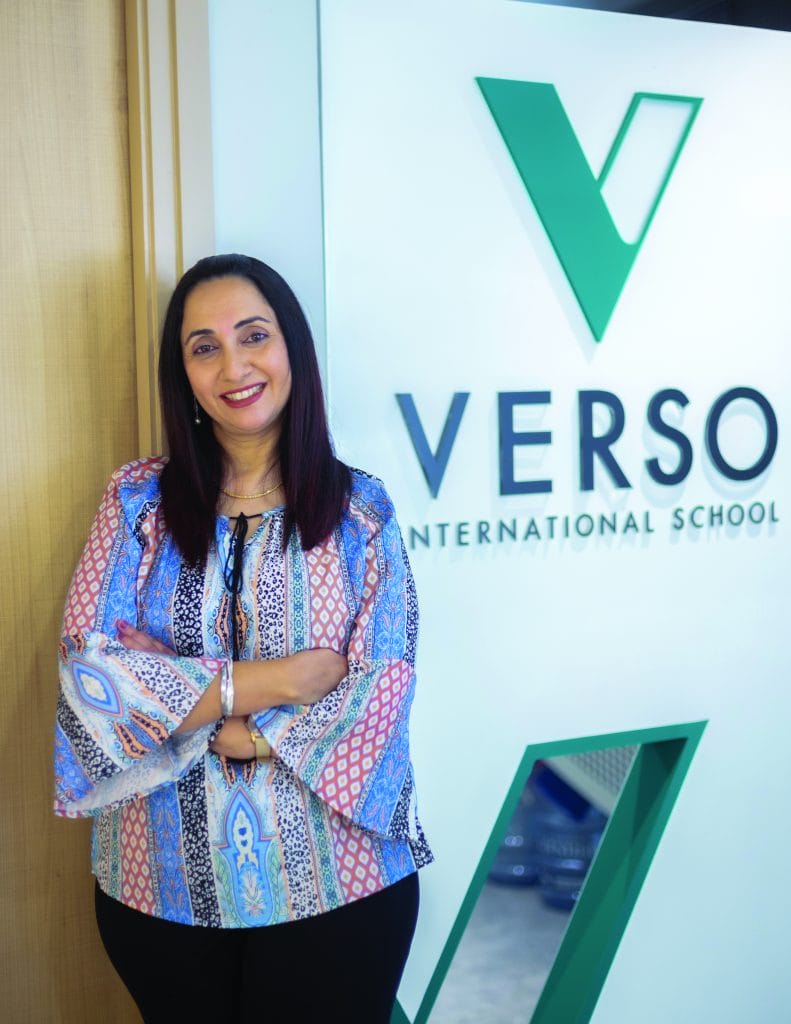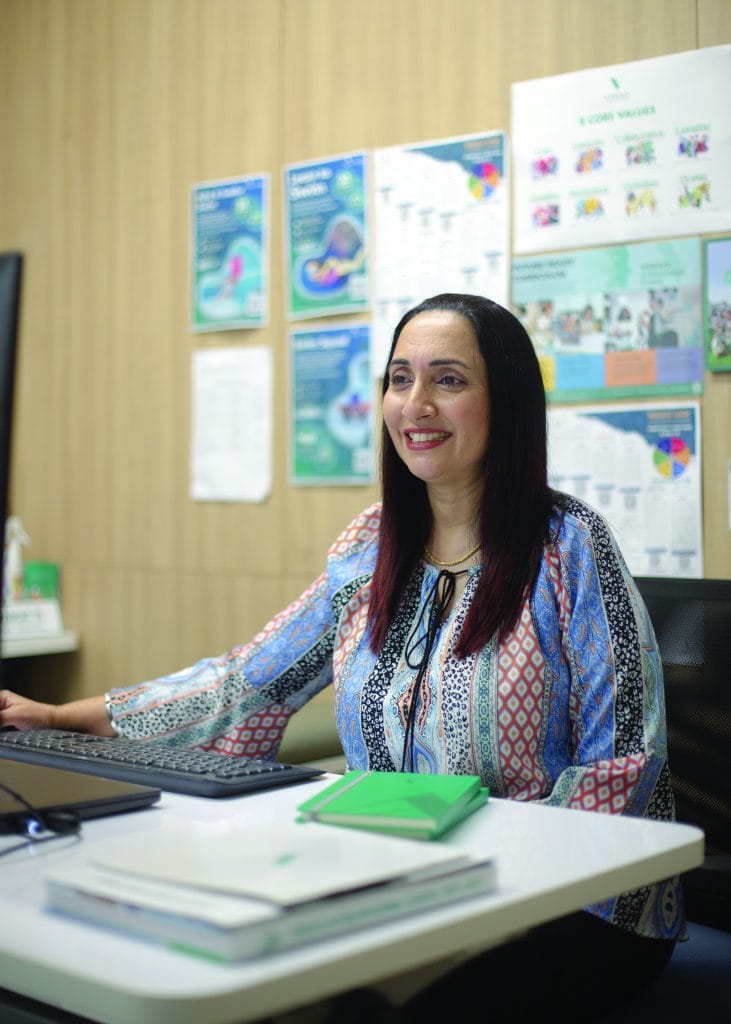Breaking the mould.
By Shradha Aswani
How many of us would be able to look at our ambitions from when we were in grade school and
say that our professional life has turned out to be exactly like we thought it would? Kittima Kaur’s high school yearbook testifies that she always wanted to be a stalwart in the field of education. When she speaks to me as the Communications Designer and Lead Storyteller at VERSO International School, it is clear she has manifested the course of her life on her terms.
Her encounter with international schools in Thailand began as a child when her parents enrolled her to Ruamrudee International School in Bangkok. The American curriculum she learnt from during her school life was challenged when she went to the Lady Shri Ram College in Delhi, where the British mode of teaching was practiced, and it was there that she graduated in commerce. As I listen further to her story, I realise that the juxtaposition of two worlds is a recurring motif in her life. Be it being rooted back to her Indian lineage despite her upbringing in Thailand, marrying into a Thai-Indian family as an expat, or her progression into the world of PR and marketing after working as a media professional for almost a decade with The Nation.
“When I started my career with the publication, I asked my editor if I could have one of those Dictaphones so I could record things, but he dismissed the idea straight up. He said, “for the first three months you are just going to jot and write things down. That is the only way you will pay attention to the subject. It was a while
before I was allowed to use a recording device,” she tells me, reminiscing about her first-ever job. It is perhaps this foundation that has led her to identify her own voice and helped her emerge as a leading professional in helping shape the narrative of teaching and learning.
In the sprawling VERSO campus in Bangna, she takes me through the crests and troughs of this journey, allowing me to capture the interaction on the record with a smile.
“I was three months old when my dad moved to Bangkok. After my schooling here, it was a bit of a culture shock to go back and study for my undergraduate in India, but that was my parents’ way of helping us reconnect with our roots. They would take us to India every two years. The college that I enrolled in did not
offer any degree in journalism or writing that I could pursue, so I just studied commerce; but I was always interested in writing. When I returned to Bangkok, I joined a publication called The Nation Junior, which was a new paper started by The Nation. The purpose of the publication was to educate the Thai youth in English, so most of our content was a combination of lifestyle, trends, and of course, educational topics that appeal to the young readers. The tone was fun and upbeat. So even when I started my career in journalism, my niche was still education.
“I climbed up the ranks from a junior reporter to editor, and stayed with the publication for almost ten years. I then decided to take a hiatus from my career to be with my two sons and focus on bringing them up, but that
did not last long! After a year and a half, I started freelancing for different publications. I later joined my former partner in running a company in the power industry, and worked at a leading concert and events company, before eventually setting up a boutique PR agency with a friend,” she tells me, as if reliving the
different phases of her life.
“We worked together for several years until I sold the company back to her in 2018. Coming from a media background, I was responsible for all media and PR-related work and very much enjoyed working with a wide range of local and international clients that included FMCGs, multinationals, and educational institutes. I also enjoyed worked with many start-ups, including Grab and Lalamove, and be able to pitch, and tell, their story to publications.”
I ask her what her title as the Communication Designer and Lead Storyteller entailed. “My role here is to design the school’s communications plan and to effectively communicate it, not only internally within
the school community and stakeholders, but also externally, through storytelling about the school and the learning experiences on the website, on all our social media platforms, through media interviews, events and activities, and various other channels and interactions with the external community. I bring my expertise in media, PR, and events, and work very closely with the marketing and admissions department,” she explains.
Kittima celebrated her third anniversary with the school last month, and her passion reflects her belief in the innovative methodology the school takes towards teaching. “We follow the American curriculum; the New York State Learning standards. The school was founded on the principles of design thinking, which is embedded in our teaching and is the DNA of the school. The classroom is flexible and less structured, unlike traditional schools, allowing for open-ended learning. Students work in a project-based learning environment, and get to work on projects they are passionate about, and through that, they learn about maths, science, languages, and all other disciplines embedded in the project. The students are assessed
through presentations of these projects at the end of the unit, on proficiencies like communication, thinking, inquiry, humanism, and ventures like advocacy or networking. We have moved away from the traditional grading or GPA system by adopting this competency-based learning model – which is what makes VERSO a future-ready school.”
The novelty of this model, needless to say, is subject to speculation, something that Kittima pushes back against, from her own personal experience. “The pandemic has definitely disrupted education and given the
opportunity for educators to reimagine what schools should be. I try to stay abreast as much as I can with the evolutions in this industry. Our leadership team keeps telling us about how this change is being implemented on a global scale, which is relayed to build faith in the parents. I encourage families to research the different systems of education available and think about what fits best with their child. This is what I did when I had to choose a school for my children.”

This idea of helping children find a fit in education and in their careers, such that these choices supplement who they are as people, instead of restricting them by absolute ideas of what they ought to do, makes it clear that what Kittima has set out to do is no micro-vision. “You can thrive in the education industry if you
want to make a difference. No two days in a school are the same. I find it very rewarding that I am telling stories that have the power to mould future generations differently.”
Her association with the industry, however, goes beyond professional fulfilment: “I think education keeps me vibrant and constantly engaged with the world. I also work closely with teachers, whom we call learning designers, to share stories about the incredible teaching and learning inside their classrooms to the
outside world. The kids, and their families, teach me something new all the time. I use the networking skills I developed during my PR days to be in the thick of everything that is happening, be it through platforms like
LinkedIn, by reading voraciously, or just absorbing all that has transpired through the day in a quiet 45-minute drive back home.”
I couldn’t let her go without a quick message for the community, including professionals like myself, and she indulges me with a smile. “It is great to see the youth today diversify and venture into different industries. My suggestion is to gather actual work experience in the industry alongside your education. Nothing will teach you more than being on the field. Get that summer job and that internship and push to get a glimpse of the real work that happens. And do not restrict yourself to one aspect. Communication, for example, is not just about writing. See how the graphics work; how the content plays on social media. And how it all comes together to create the impact that it does. The world is too fast-paced today, so you need to bring yourself up to speed with it and continue to reskill and upskill!”








